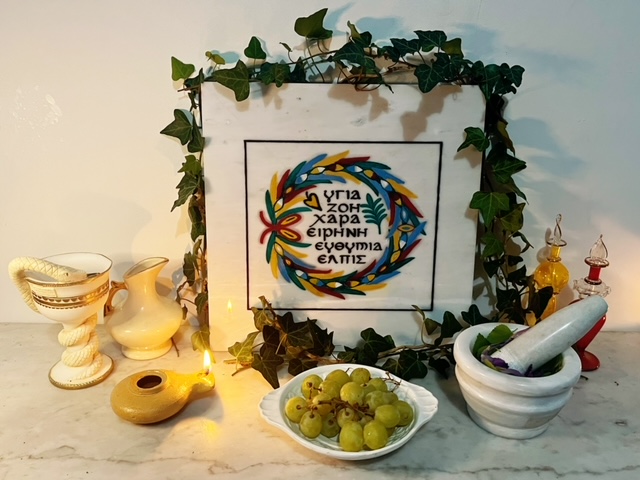In this Practical Occult article guest author Stefanos Chelydoreus, devotional polytheist, witch, mystic, and theologian from Athens, Greece, shares his insights on the personification and deification of concepts in ancient Greek and Roman cultures. For more of his writing on witchcraft, folk magic, sorcery, polytheistic theology, and mysticism, please see his blog The Greek Witch.
One of the less remembered tendencies of the ancient Greek and Roman cultures was that of personifying and deifying concepts. To the minds of the ancients, there was no terrible difference between the Gods they already knew and honored in great diversity and those they perceived behind ideas, abstract matters, or forces of nature and civilization. In fact, in many cases – as we will see – they were happy to worship them just as powerfully. A selection of these concepts, brought together as a group via both historical attestation and divine revelation, is the following: Hygieia, Zoe, Khara, Eirene, Euthymia, and Elpis. Before we delve into their divinity as well as their place in the magic of Practical Occult, however, we ought to explore the concepts themselves a bit.
Hygieia means health and is the root of many health-related words today, such as the word “hygiene”. Good health and cleanliness have been paramount to humanity since the dawn of time, even when we didn’t quite know the specifics behind germs and contamination. Being healthy is such a core element and necessity for our lives that many social and cultural customs exist to invoke the concept itself for good measure.
And we cannot speak of life without addressing Zoe, who is, quite literally, life itself. There is entirely too much to say about the importance of life to us. As living beings, we are preoccupied with this concept in our every waking moment. All our efforts seek to prolong and improve it, to stave of its feared counterpart, and to discover its meaning.
An answer to those efforts comes in the form of Khara, which means happiness. It is not enough to merely live, or even to be healthy; above all we seek happiness in life. Without it, life hardly feels worth it. But happiness is often as ephemeral as it is elusive and we must turn to other things first in order to attain it.
One of those prerequisites of happiness is Eirene, the concept of peace. Peace has many facets, some more literal and external, others more philosophical and internal. Both types are highly sought after and deeply necessary, especially in the times we live in, which so violently lack peace.
Finding peace, thankfully, leads us to discover something else as well: Euthymia, the state of serene joy. It can also be understood as cheerfulness or mirth, though this understanding hinges on somewhat more modern meanings of the word. The concept even exists in psychology as the neutral, tranquil state of a calm mind. And indeed, what could be the next step from peace, if not tranquility, and part of the approach to happiness, if not joy?
Our group of words is complete with the inclusion of Elpis, which means hope. Quite fittingly, as Pandora’s myth tells us, hope might be the last to contemplate, but is far from the least in importance. It is sorely needed, if we are to endure all the world throws at us, and in order to keep pursuing and experiencing the aforementioned concepts to which it is connected.
How does divinity relate to all this then? What does this group of noble concepts have to do with magic? More than we can imagine! As we briefly talked about earlier, the personification and deification of concepts was quite common in ancient polytheism, especially Greek and Roman, from which these concepts emerge – linguistically, mythologically, and philosophically, at least, since they themselves are quite universal.
Behind these terms and their abstract meanings, we can find goddesses who embody and express the concepts through their powers. Four of them, namely Hygieia, Eirene, Euthymia, and Elpis are attested as recognized deities in antiquity; some of them, like Hygieia and Eirene, even enjoying considerable and widespread worship. That said, all six of them exist and manifest their influence.
Alison has managed, through a combination of her own ingenuity as well as guidance from these goddesses, to create an amulet that encapsulates and strongly radiates the potencies of our divine six. By re-imagining a late Roman mosaic that included these six words, Alison has managed – through extensive sorcerous effort – to tie the blessings of these goddesses into a single occult piece of the highest caliber. Through it, one can benefit from the curative and
restorative power of Hygieia, the life-affirming and rejuvenating influence of Zoe, the fulfilling and elevating presence of Khara, the soothing and harmonious effects of Eirene, the uplifting and exhilarating force of Euthymia, and the inspiring and poignant glory of Elpis.
By accumulating the properties these goddesses emanate into a singular object of power, one can not only enjoy their manifold, highly positive, and interconnected blessings but also attain a deeper understanding and connection to them and the concepts they embody. In my own preparation for the writing of this piece, I performed rituals of communion with these goddesses and I must say, having the opportunity to stand in the presence of deities so pure and radiant in their aspects, is mind-blowing. For instance, you cannot help but feel unbridled joy when in the presence of Khara and Euthymia. Eirene brings forth a sense of inner peace unlike anything else, while Zoe feels like being immersed in the essence of life itself. Simply calling upon Hygieia provided immediate relief, and glimpsing Elpis instantly renewed my drive and motivation. One can only imagine the beneficial influences long-term ownership and use of an amulet such as this, which combines these powers, will bring about!

Stefanos Chelydoreus
Stefanos Chelydoreus is a devotional polytheist, witch, mystic, and theologian from Athens, Greece with over 19 years of experience. His practice is centered on Mediterranean polytheism with a focus on ancient Hellenic religion, theurgy, witchcraft, and Greek folk magic. Primarily devoted to Hekate, he is the creator of the Equine Serpent, and writes regularly on polytheistic theology, magic, witchcraft, and polytheistic mysticism.

One response to “Six Graces”
[…] Chicosky recently posted a piece by Stefanos Chelydoreus, on the importance and relevance of deifying concepts and abstract principles. He talks about Zoe […]